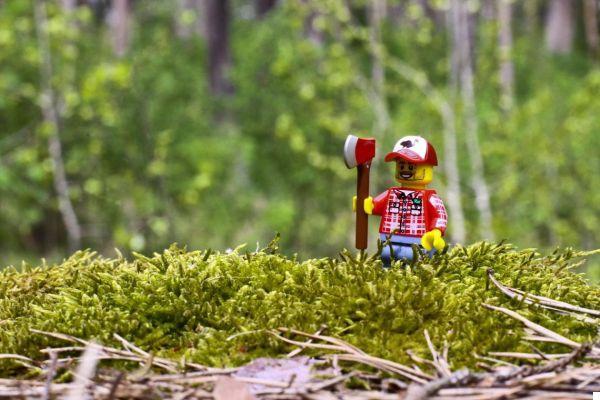
A young man needed to work, but all he had was an ax his father had left him and his enormous physical strength, so he decided to try his luck in a sawmill.
The owner hired him immediately. As soon as he was assigned his work area, the young man brandished his ax and cut down eighteen trees in one day. Encouraged by his productivity, he decided that the next day he would improve his record, so he went to rest early.
In the morning, he got up before anyone else and went into the forest. Though he tried hard, he couldn't cut more than fifteen trees.
Sad for her poor performance, she thought that perhaps she should have rested longer, so that night she decided to go to bed at sunset. At dawn he got up determined to surpass his record of 18 trees. However, that day he only cut ten.
The next day there were seven, then five, until at the end of the first week of work he cut only two. He couldn't understand what was happening to him, so he figured maybe he'd had a stroke of luck the first day and wasn't really that good at the job. He decided to resign, so he went to the foreman:
- Sir, I don't know what's happening to me, I don't understand why I stopped being productive at work. I better abandon it.
The foreman, who was a very wise man, asked him:
-When did you last sharpen the ax?
-Sharpen? I never did, I didn't have time to sharpen my ax, I couldn't waste time, I was very busy cutting trees.
Following the foreman's advice, the young woodcutter, between one tree and another, began to devote part of his time to sharpening the ax. So he managed to cut more trees.
There is a time to act and another to reflect
This interesting tale reflects our modern life. It happens to all of us like the young woodcutter: we are so busy, running from place to place, taking care of apparently important tasks that we neglect ourselves, we forget the psychological preparation necessary to tackle these tasks effectively. Consequently, it is not strange that we have to try harder and harder just to get worse results, so we end up physically and mentally exhausted.
Søren Kierkegaard had already warned us: “Many of us pursue pleasure so quickly that we gasp and hurry to leave it behind. The philosopher meant that we live too hastily to be able to enjoy small gains or to prepare ourselves adequately for the problems we face.
We live impulsively, by inertia, without stopping, without planning, without thinking much. Therefore, it is normal for our minds to become blocked and we begin to suffer from stress, chronic fatigue and diseases of all kinds. Even then, when we realize that we are not well, we move on without thinking that perhaps we should pause to reconsider what we are doing, how and why.
We must remember that sometimes we don't fall out of weakness but because we have been too strong, too long. We must avoid reaching that point. The secret of inner strength lies not in being strong under all circumstances, but in knowing when it is time to stop and regain strength.
How to sharpen our "psychological ax"?
The Roman emperor Augustus Caesar always said to his assistants: "hurry up slowly". He was referring to the need to do things consciously, to avoid unnecessary mistakes that force you to retrace your steps by wasting more time and energy. Therefore, we must always be able to move consciously in our life.
We can start with these questions:
- Are you getting enough rest or don't have a spare minute in your agenda? Never having a free minute is not good. We all need time to rest, to be alone with ourselves, away from the daily noise and stimuli that continually bombard us and overload our nervous system. Solitude and silence are essential to rediscover inner strength and peace. The time spent resting is not wasted time, it is the essential time to recharge the emotional battery.
- Are your priorities clear to you or are you plugging the holes as they arise? If you are always doing something, you will end up getting absorbed in the whirlwind of routine. You are dealing with setbacks as they appear, without wondering if they really matter. In this way, the little everyday things become a black hole that absorbs your time and energy. Furthermore, limiting yourself to reacting every time a problem arises generates a deep sense of lack of control, which is very damaging to your psychological balance because you begin to feel that you are at the mercy of fate. This is the prelude to learned helplessness. So instead of reacting automatically and rushing to solve an irrelevant problem, learn to prioritize.
- How else can you do things? Make sure you practice introspection, look inside yourself and understand what is happening to you. Maybe you are spending too much time and effort on others or on your job, and you are neglecting yourself. Ask yourself how you can achieve a more satisfying balance. Why do you do what you do? Is it really worth it? Are you in tune with your values and goals in life? Remember that there is always another way to do things, maybe it is not the shortest way but it could be the one that generates you less stress.
- 109


























